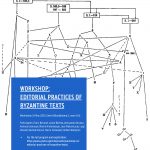During the past few decades, scholars have initiated debates about the methodologies of editing Byzantine texts. Several questions that had not been asked before, especially in relation to the specificity of Byzantine texts and manuscripts, have finally come to the forefront.
The intellectual authorship of a Byzantine text and its physical materialization often overlap and interact with each other. Many manuscripts, if not literally autographs, stand very close to the original version of texts. Sometimes, there is not even one single original, but the different versions are the reflection of authorial drafts or later elaborations. Manuscripts are often nonuniform and unstable, and present a complex and multilayered hierarchy of texts. Also, the changing linguistic reality of the Middle Ages in tension with a strong school tradition of grammar produces texts that invite the interventions of editors.
This workshop gathers together a group of scholars willing to share their reflections and experiences with editing medieval Byzantine texts. The workshop will address these and other similar questions:
- How should editors deal with punctuation and accentuation? Which are the meaningful practices in manuscripts? And how do these relate to the oral performance and visual layout of texts?
- How should editors reproduce unconventional orthography, linguistic flexibility and the fluctuation of registers? Which role does “school grammar” play in this respect?
- Which is the role of literary genres and textual types? How should editions mark intertextuality and parallels? And what about the case of metaphrasis and rewriting?
- What is the best way to edit texts that depend on other texts, such as commentaries and marginal scholia? And how can editors synoptically display the layers of successive annotations and textual expansions?
- Why and how should we edit unfinished and preliminary texts, especially when a more accomplished version is preserved? Similarly, how should we treat apographa, especially the late copies of pre-Byzantine texts?
Programme
Date: Wednesday 24 May 2023
Location: leslokaal 0.4 (Blandijnberg 2, 9000 Gent)
9-9.30: Introduction (Floris Bernard – Julián Bértola)
9.30-10.10: “The challenges of editing rhetorical texts” (Antonia Giannouli)
10.10-10.50: “The complexities of editing florilegia” (Alessandra Bucossi)
10.50-11.10: Coffee break
11.10-11.50: “Editing Andronikos Kallistos’ works: Problems, remarks, solutions” (Luigi Orlandi)
11.50-12.30: “Editing Aristotle’s Organon in 1495: The models for Aldus Manutius’s Editio princeps of the First Analytics” (José Maksimczuk)
12.30-14: Lunch break
14-14.40: “A liturgical poem on the passion of Christ (BHG 413m) and its editorial challenges” (Maria Tomadaki)
14.40-15.20: “Open traditions: Use and reuse of book epigrams” (Rachele Ricceri)
15.20-15.40: Coffee break
15.40-16.20: “Between Symeon the Logothete and Theophanes Continuatus: How to edit the intermediary versions (Logothete B)” (Staffan Wahlgren)
16.20-17: “Byzantine linguistic reality and the edition of texts” (Martin Hinterberger)
17-17.30: Wrap-up session
Registration
This event is open for anyone who is interested to attend in person or online (a link will be sent the day before the conference).
To attend the conference, please register here.
